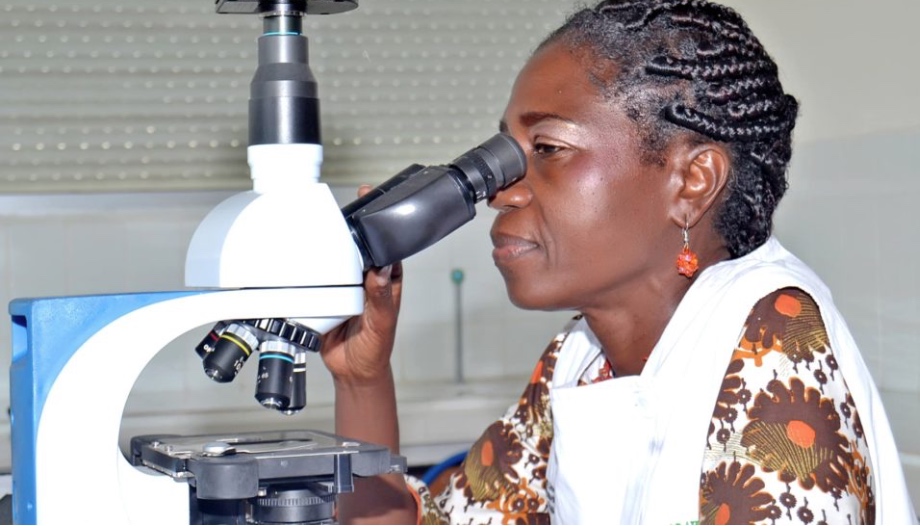 Duni Sawadogo: "Getting an education changed my life".
Duni Sawadogo: "Getting an education changed my life". Harambee 2021 Award recognizes the advancement of women in science
Harambee 2021 Award recognizes the advancement of women in scienceOn the occasion of the awarding of the Harambee Award for the Promotion and Equality of African Women, Omnes has interviewed the Ivorian Professor of Hematology Duni SawadogoWe spoke with her about her work as a promoter of women's access to university education, especially in the scientific field, and the problem of medicine trafficking in Africa.
Only 7.6% of women have access to university studies in Côte d'Ivoire. In your case, you hold a relevant position in a university laboratory and are part of the Management Committee of the AIRP (Autorité Ivoirienne de Régulation Pharmaceutique). She is also leading a project to encourage women's access to scientific careers.
R.- This task started in my family. With intellectual parents, I never had any impediment on their part with regard to my studies. Later I realized that I was privileged in this respect. I decided to start a university career and to form a team with many women - even if it meant more work - to give back a little of what I had received for free since my childhood. Thus began this task of educating women.
In many countries, the gap in access to education for women is still large, sometimes due to traditional or family pressures. In this sense, how can this gap be reduced without affecting other important tasks, such as caring for or raising a family, etc.?
R.- We must start by creating more secondary schools in each village first and then more universities. In this way, the fact of being schooled will not result in a break in family ties as it happens when a girl leaves her family to go to another city to continue her studies. This is the reason why families refuse to send their daughters to schools after primary school. If women are educated, they will be able to decide for themselves what is important at any given time: to give priority to raising a family or to devote themselves fully to a scientific career.
In Europe there is, somehow, the idea that "Africa must be helped", perhaps imposing certain Western elements or belittling some positive features of African idiosyncrasy and traditions. How not to fall into paternalism in these tasks?
R.- It seems to me that three factors are involved in this situation. The first is globalization, which transmits the values of a minority to the whole world. The second is the fact that many media transmit very negative images of Africa, where only natural catastrophes or war appear. Thus, everything that comes from this continent seems to have little value. In this context, the solutions come from the countries of the North. The third factor is that some, or many, Africans who belong to the intellectual elites of the continent are ashamed of their origin. In reality, they know very little about the history, the achievements of their ancestors, the value of what is proper to this continent. By teaching the truth about Africa, we will not fall into this paternalism that is found in both Europe and Africa.
You work in the field of drug safety and the fight against counterfeit medicines and drug trafficking, what are the main problems of these realities?
R.- Illegal trafficking of counterfeit or substandard medicines is a global and very complex problem. This illegal trade in medicines is very lucrative. It is supposed to generate 20 times more money than the sale of heroin. It is estimated that a $1,000 investment yields 500 times as much. The WHO estimates that about one in 10 medicines sold may be the result of this trafficking. This trafficking uses different strategies depending on the continents.
In Europe and America, it is about medicines sold over the Internet. But this traffic is very important on the African continent, which manufactures only 2% of the medicines it uses. In Africa, these medicines are found on the street or in street markets. Abidjan, for example, is the largest market for illicit drugs in West Africa. These medicines come mainly from China and India.
The WHO estimates that, each year, some 320,000 children die in Africa from complications related to taking fake or substandard medication.
My country, Côte d'Ivoire and Cameroon belong to the group of countries where drugs are manufactured. Antibiotics and antimalarials are the most sold pharmaceutical specialties on the African continent. What is really serious is that this traffic causes many deaths because it is directly related to resistance to antibiotics and antimalarials and to a higher frequency of renal failure.
The World Health Organization estimates that, each year, some 320,000 children die in Africa from complications related to taking fake or substandard medication. An estimated 170,000 from childhood pneumonia and 150,000 from malaria. It is because of all these factors that this illicit trade is very harmful.











